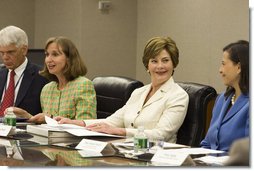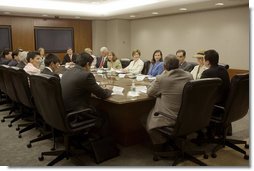
 |
For Immediate Release
Office of the First Lady
July 5, 2006
Mrs. Bush's Remarks in a U.S. Afghan Women's Council Roundtable
The State Department
Washington, D.C.
11:01 A.M. EDT
MRS. BUSH: Thanks so much. Thank you very much, Secretary Dobriansky. And Mr. Minister, welcome. It's very nice to have this chance to get to meet you and be with you today. And Ambassador, thanks so much, again.
I've had a really very enjoyable and interesting time in my relationship with the Afghan American Women's Council. I've met the Afghan women who are part of it. I've had two trips to Afghanistan -- one with the President and one with the Women's Council, actually, I partnered with them when they visited there.
 I've also been able to welcome to the White House a number of Afghan
women, both teachers who are training here at the University of
Nebraska, each one of those classes, or Afghan women who are here
working in partnership with the Afghan Women's Council, Afghan American
Women's Council.
I've also been able to welcome to the White House a number of Afghan
women, both teachers who are training here at the University of
Nebraska, each one of those classes, or Afghan women who are here
working in partnership with the Afghan Women's Council, Afghan American
Women's Council.
I just got to give the commencement address at Roger Williams University, where we had the very first graduating class. Four Afghan girls who had started four years ago to Roger Williams University graduated, and that was also a program that I learned about through the Afghan American Women's Council.
One of the major projects that I've been the most involved in and the most interested in is the Women's Teacher Training Institute in Kabul, which I did visit when I was there. After September 11th, when American women especially looked at Afghanistan, American women were really, I'll have to say, shocked that women were not allowed to be educated, that girls were not allowed to be educated. It was something that none of us really could imagine. And immediately, women, American women, stood up to stand with the women of Afghanistan. I saw it everywhere. When I gave the radio address about Afghanistan, women who sell cosmetics at the department store that I went to right after that thanked me, and I could tell they were standing with the women of Afghanistan, and really felt a sisterhood with them and wanted them to be able to succeed.
The other thing we also know, because women in the U.S. didn't get the right to vote, either, until the last part of the -- early part of the last century, but we know that societies can succeed and democracies can succeed and economies can succeed if everyone is involved. And if half the people are left out, then it's very difficult for societies to succeed.
So all of us knew, and this is what we were already interested in anyway, in my office, it's what we were working on, and that's education in the United States, education here. So it seemed, really, a natural step to talk about education in Afghanistan and education specifically for women, but for boys, too, for girls and boys, we need, really, excellent education.
 So we've started with the idea of the Teacher Training Institute, which
would give -- a dorm which would give women a safe place to live when
they were in -- at Kabul University in the Teacher Training program, and
would also have the effect of educating as many women as possible -- and
men -- educating as many teachers as possible so when they went back to
their provinces they could, in a cascading effect, educate more teachers
so we could educate as many teachers as possible.
So we've started with the idea of the Teacher Training Institute, which
would give -- a dorm which would give women a safe place to live when
they were in -- at Kabul University in the Teacher Training program, and
would also have the effect of educating as many women as possible -- and
men -- educating as many teachers as possible so when they went back to
their provinces they could, in a cascading effect, educate more teachers
so we could educate as many teachers as possible.
This fall, I'm going to be convening, in New York, along the time of the United Nations General Assembly, with United States Department of Education and the U.S. State Department, USAID and UNESCO, a conference on global literacy. And we're going to -- it will be during the time of the UNGA when world leaders will be there from around the world. And it's a way for us to meet, really, every country to come together, every U.N. country to come together and talk about what we can all do to make sure -- what each government can do to make sure that children and adults are literate in their countries.
So I have this opportunity to invite you all and to invite people from Afghanistan then, to come then, and I hope you'll be there with me.
We look forward to many, many years of friendship and work with the country of Afghanistan. The people of the United States are invested in Afghanistan, and we really want Afghanistan to succeed. And I hope the people of Afghanistan know that.
So, welcome. Good to see you.
END 11:06 A.M. EDT